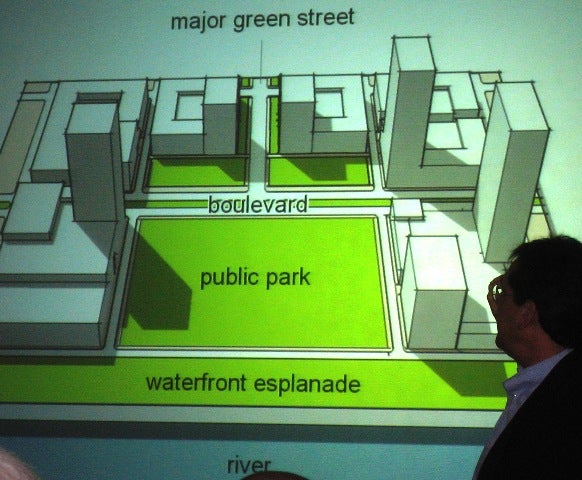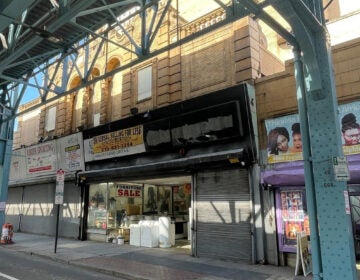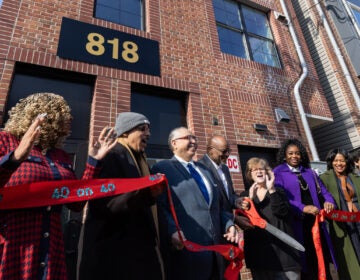During the monthly meeting of the steering committee for the Central Delaware Waterfront planning process, Penn Praxis began laying out the first preliminary conceptual design guidelines that will be used to establish a foundation upon which to build a lasting and civic vision for seven miles of Delaware Riverfront that is crucial to the natural, historic and commercial future of Philadelphia.
“This document is only the start of a process to lay out the framework for sound urban waterfront development that is consistent with the values and principles that have emerged from the planning and civic engagement process to date,” said Praxis director Harris Steinberg.
Steinberg emphasized that the memo was by no means a final document. What it is intended to prompt is a discussion and planning process that will ensure that the Delaware Waterfront is developed in accordance with the civic principles that were identified in the public forums and design workshop.
“Specifically, the public development guidelines need to address establishing a rational street structure, and open space framework and a form-based regulatory code,” he said.
Steinberg detailed highlights of those public development guidelines, including extending the existing street grid to riverward neighborhoods, a deeper commitment to mass transit, strict adherence to appropriate parcel size, public waterfront access, open space, and unimpeded view sheds of the waterfront.
“The private development guidelines will ensure the public good by calling for access to the water, public amenities, sound urban design and attention to quality of life issues,” Steinberg said.
The private development guidelines call for building designs and siting that encourage a lively urban setting and community, parking that protects pedestrian access and views of the waterfront, integrated open space, the highest quality design and sustainable contruction.
Following his presenation laying out the fine points in the memo, Steinberg asked member of the steering committee and public in attendance what important details were missing and what material might be edited out.
Feedback ranged from a concern that the Central Delaware Waterfront advisory group should still take a “best practice” position on whether two casinos should be sited on the riverfront, to a point that addressed the importance of creating enough high-level approval, civic buy-in and momentum around the waterfront plan to make it impossible to stop.
“One of the tensions I think we feel with the process is timing,” said John Childress, Director of the African American Chamber of Commerce. “Be careful when you say a plan is 50 years out. It might be the right thing to do but human nature makes that range problematic.
“And when we look at I-95, how much approval do we need to implement what we want to do? If casinos are coming because the state wants them to be sited here, what do we do?
A voice of caution related to a specific parcel, came from John Edelstein of the city’s Commerce Department, who said the planned swath of open space shown on the Conrail property site at the northern end of the study area might be problematic because the city was in talks with heavy industrial interests and that kind of business might make the waterfront section of the site inaccessible to the public.
City planning director Janice Woodcock said the plan should imagine on a large scale and should be a roadmap for a potential new zoning commission. “This group should put out a plan about what the waterfront land use scenarios should be,” she said. “We have the opportunity to say ‘this is what it could be’. It’s a painterly thing. Here are a number of ways the waterfront could be used. It’s about form and beauty.”
For more detailed information click on the draft of a large-scale development memo that PennPraxis prepared for review at the central Delaware steering committee.
***
This Saturday,
Neighbors Allied for the Best Riverfront will hold a design workshop to develop alternative design proposals for the 2 proposed riverfront casino sites — the “Sugarhouse” site at Delaware and Frankford in Fishtown and the “Foxwoods” site at Columbus and Reed in South Philadelphia. Using the very values that were solicited from the public in the Penn Praxis planning forums as true directives, NABR will bring together community residents and planning and architecture professionals to develop specific proposals for these 2 sites in lieu of casinos. Planphilly will cover the event.
***
The Central Delaware Riverfront Advisory Group will meet May 7, at 8 a.m., 1515 Arch Street, 18th floor.







